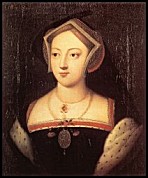|








powered
by
SignMyGuestbook.com
|
|

The thirthieth of June in the Year of Our Lord, 1521 - Late evening, 9:30
Tis come to mine attention that there do be goodly souls who nay grasp
all of the written communications contained herein
Tis come to mine attention that there do be goodly souls who nay grasp all of
the written communications contained herein.� I hath made concessions of
course to let moderns 21st century spellings prevail.� Therefore, prudence
dictateth that I provideth these goodly gentles with a guide to reading and thus
interpreting mine often confusing terminology and syntax.� I most humbly apologize
for any discombobulation and flummoxation� my writings hath caused for I do
be the most gentle of souls whose sole purpose in life be to bring mirth and merriment.�
So without further adieu, and in keeping with the fine tradition of education
that hath been established at the Mary Boleyn School of Charms and Graces for
Young Maidens, Washer Women and the Occasional Charity Case, I presenteth to
each and every one of thee, Mary Boleyn's Guide to Speaking and Understanding
the King's English.
Lesson of the First Part - Pronouns (Pretendeth that I actually speaketh 21st century
vernacular!)
(Remembereth that Sixteenth century English doth recognize formal and informal
forms of "you".)
Thee - Formal "you" or multiple "yous" used in
"For thee" or "To thee".
Thou - Informal or singular "you" used as subject of sentence.
- "Thou art lovely." or "What thinkest thou?"
Ye - Multiple "yous". - "What say ye goodly chaps!"
Thy - "Yours" -� "Be that thy new gown?"
Thine - "Yours" in front of words beginning with vowels.�
"Thine eyes."� This rule also applies to the words "my"
and "mine".� "My hair."� "Mine
affliction."
Lesson of the second part -
Verbs
Present tense -� Example:� "Doth pray" and "Prayeth"
doth mean the same thing as in generality.� "Do be
praying."�� wouldst indicate an action occurring at that precise
moment.� Tis nay confusing and all are as interchangeable as Nan's rotating
wardrobe of knickers.
"To Be" Verbs - be, do, dost, art.� "What be thy
pleasure?"� "That do be a fetching new chemise!"�
"What dost one think at a time like this?"� "Whyfore art
thou frowning?"� In essence, use "be" where in 21st century
English "is" wouldst be used.� "Is" be bad!� I
knoweth well that it for a time may seem improper and of unseemly grammatical
presentation, however, I assure thee that it be most correct!
Past Tense - Add "didst" in front of most any very to make it
past tense.� "He didst pray."� "We didst heartily
feast."
"Wouldst", "Couldst", and "Shouldst"
- Prithee, one shouldst make hearty use of these important verbs as oft as
possible.���
Lesson of the Third Part -
Aboveth all, BS with finesse!� Prithee, taketh all the time alloted to thee
on this goodly planet that the Good Lord hath so generously provided to us and
our care and useth as MANY words as humanly possible to express even the most
simplistic and asinine of ideas.� The more the merrier!
Well dearhearts, methinks this do be all
well and good as a primer.� Prithee, if there be any questions whatsoever,
hesitateth not to pose them to me in written form whereupon I shouldst evalute
thy queries and post mine assistance herein!
Cheers and I remain faithfully thine....
Mary B.
�
�
|